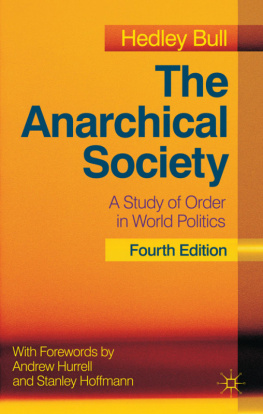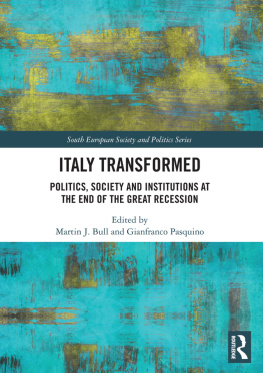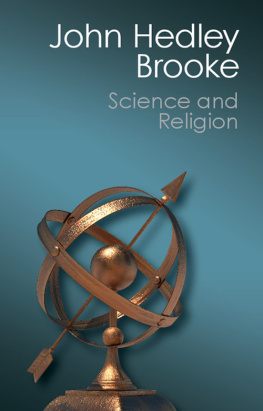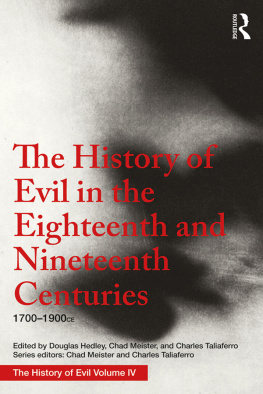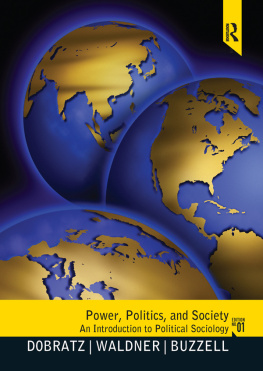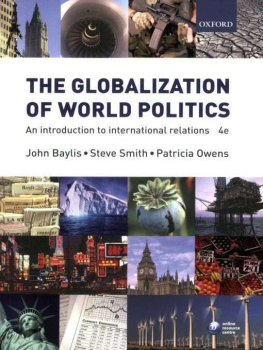The Anarchical Society
The Anarchical Society
A Study of Order in World Politics
Fourth Edition
Hedley Bull
Forewords by Stanley Hoffmann and Andrew Hurrell


Hedley Bull 1977
Foreword to the 2nd edition Stanley Hoffmann 1995
Foreword to the 4th edition Andrew Hurrell 2012
All rights reserved. No reproduction, copy or transmission of this publication may be made without written permission.
No portion of this publication may be reproduced, copied or transmitted save with written permission or in accordance with the provisions of the Copyright, Designs and Patents Act 1988, or under the terms of any licence permitting limited copying issued by the Copyright Licensing Agency, Saffron House, 610 Kirby Street, London EC1N 8TS.
Any person who does any unauthorized act in relation to this publication may be liable to criminal prosecution and civil claims for damages.
The authors have asserted their rights to be identified as the authors of this work in accordance with the Copyright, Designs and Patents Act 1988.
First edition 1977
Reprinted 6 times
Second edition 1995
Reprinted 6 times
Third edition 2002
Fourth edition 2012
Palgrave Macmillan in the UK is an imprint of Macmillan Publishers Limited, registered in England, company number 785998, of Houndmills, Basingstoke, Hampshire RG21 6XS.
Palgrave Macmillan in the US is a division of St Martins Press LLC, 175 Fifth Avenue, New York, NY 10010.
Palgrave Macmillan is the global academic imprint of the above companies and has companies and representatives throughout the world.
Palgrave and Macmillan are registered trademarks in the United States, the United Kingdom, Europe and other countries.
ISBN: 9780230393394 hardback
ISBN: 9780230393387 paperback
This book is printed on paper suitable for recycling and made from fully managed and sustained forest sources. Logging, pulping and manufacturing processes are expected to conform to the environmental regulations of the country of origin.
A catalogue record for this book is available from the British Library.
Library of Congress Cataloging-in-Publication Data
Bull, Hedley.
The anarchical society : a study of order in world politics / Hedley Bull. 4th ed. p. cm.
Includes bibliographical references and index.
ISBN 9780231161282 (cloth:alk.paper) ISBN 9780231161299 (pbk.: alk. paper)
1. International organization. 2. International relations. I. Title.
JZ1308.B85 2012
341.2dc23
2012009969
Printed in China
Contents
For Emily, Martha and Jeremy
Foreword to the Fourth Edition
Andrew Hurrell
Thirty-Five years on, the standing of The Anarchical Society as a classic text is clearer than ever. It provides the most systematic and powerful exposition of the view that states form among themselves an international society; and it develops this idea as a powerful vantage point from which to analyse and assess the possibilities of order in world politics. At the core of The Anarchical Society is the question: to what extent does the inherited political framework provided by the international society of states continue to provide an adequate basis for world order? Bulls work links closely with the debates on global governance that have been so prominent since the end of the Cold War. But his focus is less on theoretical understanding of particular institutions and more on assessing the overall character of institutionalization in world politics, the normative commitments inherent in different ways of governing the globe and the adequacy of existing inter-state institutions for meeting practical and normative challenges. The Anarchical Society remains one of the most important and most-cited works of the so-called English School of International Relations.
Clearly a very great deal has changed in the 35 years since the book was first published and the first part of this Foreword asks how well Bulls analysis has held up and sets his approach and conclusions against some of the major changes that have occurred in the structures and practices of world politics. The second section assesses the relationship of Bulls thinking in The Anarchical Society to some of the main subsequent developments in International Relations theory.
The Anarchical Society and contemporary world politics
On the face of it, there is much in Bulls work that appears clearly outdated. His heavy emphasis on the Great Powers, on the balance of power and on war as an institution of international society; his invocation of Grotius, Hobbes and Kant; and his central concern with the ideas and practices derived from the classical European state system of the eighteenth and nineteenth centuries all this seems far removed from the study of contemporary world politics. Much of Bulls thinking was heavily shaped by the concerns of the Cold War, by the dangers posed by nuclear weapons and by the problems of managing nuclear deterrence, and by the centrality of superpower rivalry. He was deeply sceptical about many of the arguments made in the 1970s that economic interdependence was undermining the role of the state and transforming world politics. His emphasis on continuity seemed then and seems much more now, to downplay the dynamic forces at work in global politics and to fail to recognize the extent to which the international system has been moving decisively beyond Westphalia. For many readers the dramatic and far-reaching changes associated with globalization make it very difficult to accept Bulls prescriptive bottom-line: that a thin pluralist international society of states remains the best available means of upholding world order.
This was certainly the direction in which so much of the analysis of international relations after the Cold War appeared to be moving. Global order was widely understood through the lens of liberal internationalism or, in the language of The Anarchical Society, liberal solidarism. Globalisation was rendering obsolete the old world of Great Power rivalries, balance of power politics and an old-fashioned international law built around state sovereignty and strict rules of non-intervention. Bumpy as it might be the road seemed to be leading away from Westphalia with an expanded role for formal and informal multilateral institutions; a huge increase in the scope, density and intrusiveness of rules and norms made at the international level but affecting how domestic
There is undoubtedly much in The Anarchical Society that seems hard to square with the changes that have taken place in global politics after the Cold War. Bull had, after all, expressed little interest in formal international institutions, including the United Nations. He believed that what he saw as the deeper institutions of the balance of power, war, the great powers, diplomacy and international law were of more abiding importance. He had been generally critical of Kantian optimism about the spread and impact of liberal democracy the set of claims that would develop into democratic peace theory. The impact of economic globalisation and political democratisation, the increased importance of trans-national civil society, the increased density, scope and range of international institutions, the multiple problems that result from the break-up of states and ethnic self-assertion all these factors have developed to such a point that, for many commentators, Bulls narrow focus on the society of states is now wholly inadequate and out-dated.
Next page
